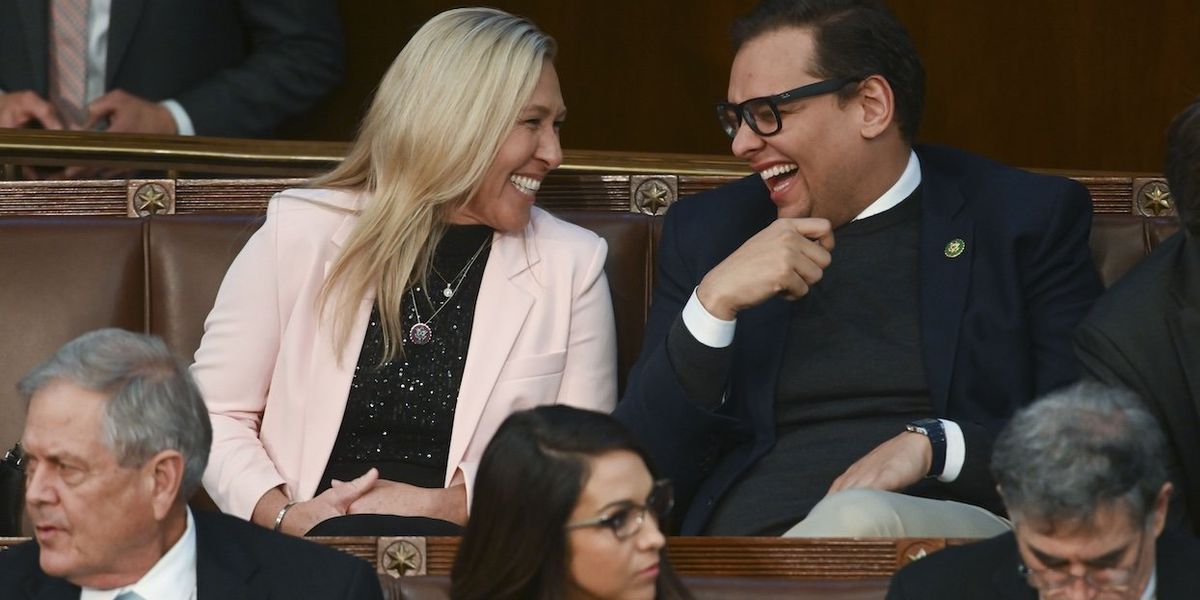Rep. Marjorie Taylor Greene on Monday formally urged President Donald Trump to commute the prison sentence of former Republican congressman George Santos, calling his 87-month term a “grave injustice” and an example of unequal treatment under the law.
Why it matters
- Rep. Marjorie Taylor Greene's appeal highlights ongoing debates about judicial fairness and sentencing disparities.
- The case of George Santos raises questions about accountability and political influence in legal matters.
- Greene's intervention may influence public opinion and encourage other lawmakers to take similar stances.
In a notable move that has sparked conversation around judicial fairness and accountability, Rep. Marjorie Taylor Greene publicly requested that former President Donald Trump consider commuting the prison sentence of George Santos, the former Republican congressman from New York. Greene described Santos' sentence of 87 months as a “grave injustice,” asserting that it exemplifies a pattern of unequal treatment within the legal system.
Santos, who faced legal troubles that culminated in his conviction on multiple counts, has been a polarizing figure in American politics. His tenure in Congress was marred by controversy, including allegations of fraudulent behavior and misrepresentation of his background. Despite these serious accusations, Greene's intervention signals a broader ideological commitment among some Republicans to rally behind their party members, even amidst serious legal challenges.
Greene's statement came on Monday, where she voiced her concerns regarding what she perceives as an overly harsh penalty for Santos. During her remarks, she emphasized that the sentence imposed on Santos not only seems disproportionate but also reflects a systemic bias against certain individuals based on their political affiliations. Greene's portrayal of the situation suggests that the legal repercussions faced by Santos may differ significantly from those encountered by individuals in similar circumstances who lack political connections or public visibility.
The congresswoman's call for clemency from Trump, who is known for his controversial approach to justice and law enforcement, is indicative of her alignment with a faction of the Republican Party that prioritizes loyalty and solidarity over the punitive measures typically advocated in the realm of law and order. Greene’s stance may resonate with constituents who feel that the justice system has been weaponized against political adversaries, thus framing Santos’ legal troubles as part of a larger narrative of persecution.
Supporters of Greene may view her advocacy as a necessary stand against what they perceive as an unjust system, while critics argue that it undermines accountability and the rule of law. The split reaction to her request underscores the deepening divisions within American political discourse, especially as it pertains to issues of justice and fairness.
The implications of this case extend beyond Santos himself; it raises broader questions about the integrity of the legal process and the extent to which political affiliation can shield individuals from accountability. Greene’s intervention might encourage other lawmakers to vocalize support for colleagues facing legal challenges, potentially creating a more complex landscape in which political loyalty and legal accountability intersect.
As discussions around Santos' sentence continue, the public and lawmakers alike may need to grapple with the implications of a system that can appear to favor some while punishing others disproportionately. Greene’s remarks not only seek to support Santos but also reflect a growing sentiment among certain Republican circles advocating for a re-examination of how justice is administered, particularly in high-profile political cases.
The future of Santos remains uncertain, as his legal team explores options for appeal and potential avenues for reducing his sentence. Meanwhile, Greene’s vocal support may provide Santos with a platform to rally his supporters and galvanize public opinion in favor of his cause. The situation is emblematic of the broader political climate, where justice and politics are increasingly intertwined, prompting discussions about the ethics and fairness of the legal system in America.
As this story develops, it will be crucial to monitor how Greene’s advocacy influences public sentiment and whether it will lead to any tangible changes in Santos' legal circumstances. The case serves as a reminder of the complexities surrounding justice, politics, and the implications of public support in legal matters.











